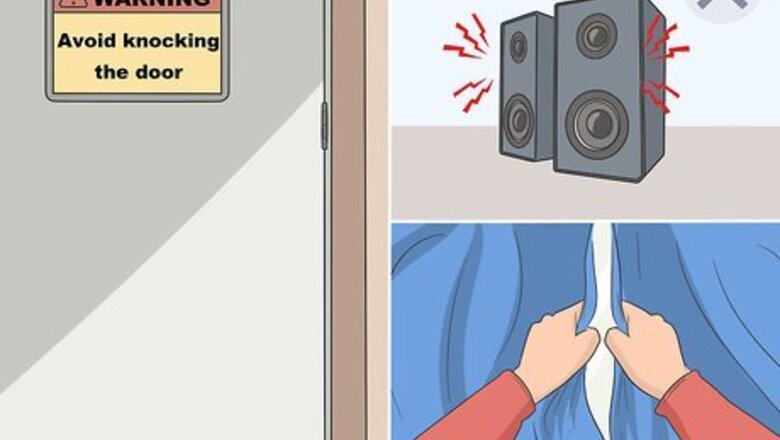
views
Keeping Your Dog Quiet
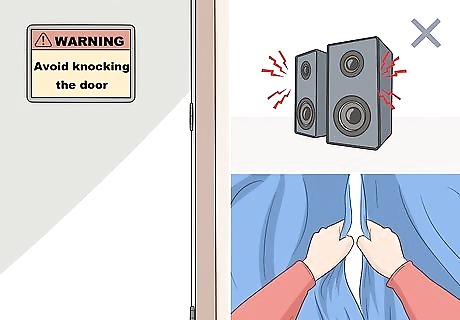
Eliminate any motivation for barking. If you want to keep your landlord from discovering your dog, you need to keep it quiet. Start by removing any motivation for barking. Try to observe when your dog barks and work on eliminating anything that encourages the behavior. For example, if your dog barks at pedestrians, keep your blinds closed. If your dog tends to bark when you play music, avoid playing music in your apartment. Many dogs bark at the door if the doorbell rings or someone knocks. Try discouraging your guests from knocking or ringing the doorbell. Explain the situation to them so they understand why this is necessary. Neutering/spaying your dog will make him/her calmer.
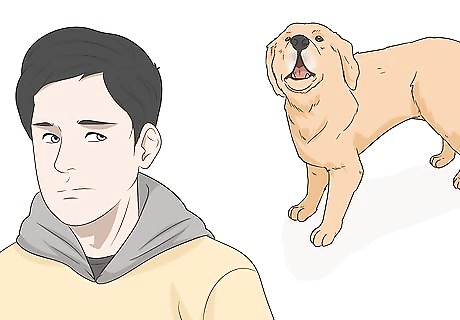
Ignore barking whenever possible. It is probably not always possible to ignore barking, especially if you're trying to hide a dog from your landlord. If your dog is barking loudly when you're home, you will probably need to keep it quiet right away. However, dogs may see your attention as a reward. Whenever possible, ignore the barking as this can help discourage the behavior. If your dog starts barking, do not even look at the dog. Turn your back to it and ignore the behavior until the dog quiets down. As soon as your dog gets quiet, reward it immediately. You can give your dog a treat and praise. Once your dog learns it is being rewarded for keeping quiet, lengthen the amount of time the dog needs to stay quiet before receiving a reward. Again, this method is best used outside your apartment. Try to ignore your dog's barking when out on walks or visiting a friend.
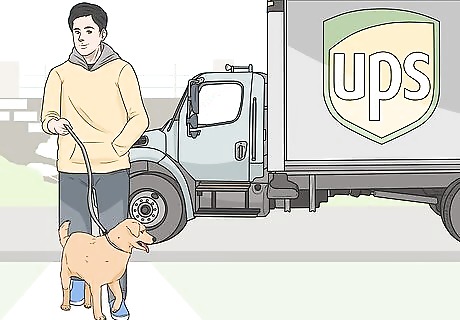
Desensitize your dog. Dogs may bark if they get nervous or frightened easily. If your dog tends to bark in response to particular stimuli, work on de-sensitizing your dog to that stimuli. First, identify what makes your dog bark. For example, maybe your dog barks in response to UPS trucks. Many dogs perceive the UPS driver as an intruder. Start exposing your dog to the stimuli at a distance. For example, take your dog to a post office where trucks are parked. Have your dog look at the trucks from across the street. Feed it treats so it associates the truck with happy moments. Repeat this multiple times. Learn when you can expect the UPS truck to drive by your home. Feed your dog treats each time the UPS truck drives by, and stop as soon as the truck is gone. With time, your dog should stop barking in response to a UPS truck. This may take time, however. You will have to give it a few weeks or months.
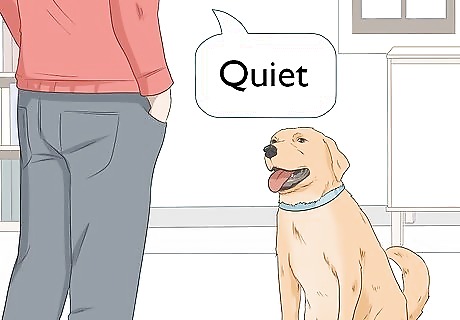
Teach the quiet command. "Quiet" can be taught as a command. You will first have to teach your dog to "Speak." You can do this by saying "Speak" and encouraging barking. Reward the barking when it occurs in response to a command. Once your dog knows "Speak," it can learn "Quiet." Bring your dog somewhere away from your apartment to teach this command. Say "Speak" and allow your dog to bark. When your dog starts barking, say "Quiet." When it stops barking, reward it. Repeat until your dog knows it should stop barking when it hears "Quiet." You can use the quiet command when your dog gets noisy in your apartment. If a car goes by and your dog barks, say "Quiet." If your dog barks in response to the doorbell ringing, say "quiet."
Preventing Your Landlord from Seeing the Dog
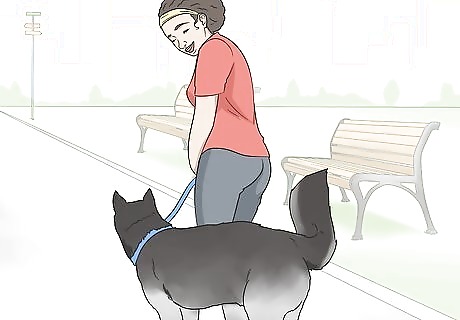
Walk your dog frequently, but time it carefully. Dogs may make more noise and commotion if they're not getting enough exercise. Make sure to play with your dog and walk it regularly. With a smaller dog, you may be able to adequately exercise it through playing games in your home. Be careful, however, if you live on an upper floor, especially if you live without carpeting. You may want to lay a rug down to muffle the noise of your dog's paws. Walk your dog frequently, but be careful where you walk your dog. You will have to take the dog out an exit where you're unlikely to run into neighbors or your landlord. For example, sneak your dog out back. You may want to only walk your dog late at night, and use something like a newspaper or a training pad for your dog to its business during the day.

Keep the dog somewhere else when your landlord is over. You should have a game plan in the event your landlord visits. Have a friend or family member to call who can take the dog for a day. You do not want the landlord to see your dog and figure out what is happening. Know when the landlord will show up. For example, the landlord may be coming over to check on a leak in your sink. Have a plan that day to hide the dog. You may want to keep your dog in a separate room when you are not at your apartment. If you have a roommate, one of you can walk the dog when the landlord visits. You can also see if a friend can watch the dog for a day if your landlord is coming over. You can have a friend pick up the dog in the morning and bring it back at night.

Vacuum and clean to keep pet hairs hidden. Your landlord may get suspicious if he or she notices signs of your dog in the apartment. Work on keeping any evidence hidden by regular vacuuming. You want to remove any traces of dog hair. Do not just focus on vacuuming the floor. You should also concentrate on vacuuming any furniture. This is especially important if you have carpet. Carpet can make a dog's presence obvious.

Have a friend vouch for you if you get caught. Despite your best efforts, you may end up getting caught with a dog. In this case, you will have to think of an excuse. A good excuse is to say the dog belongs to a friend, and you're only watching the dog for the day. The landlord may be a bit more vigilant after finding a dog in your apartment. You may have to be extra careful about hiding the dog if you get caught.
Preparing for Consequences
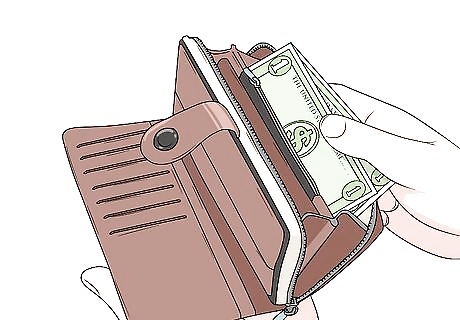
Make sure you have the money to move fast. You may get evicted if you get caught with a dog. If dogs are clearly against the rules in the lease, you have broken the lease by hiding your dog. Your landlord may require you to move fast. Moving is expensive. In addition to paying for things like moving trucks and gas, you will have to pay to transfer your utilities. You will also have to put down a deposit on a new apartment, and may have to pay first month's rent upfront. Make sure you have a nest egg to front these expenses in the event you have to move fast. The potential financial fallout is one of the reasons it's risky to sneak a dog in an apartment.
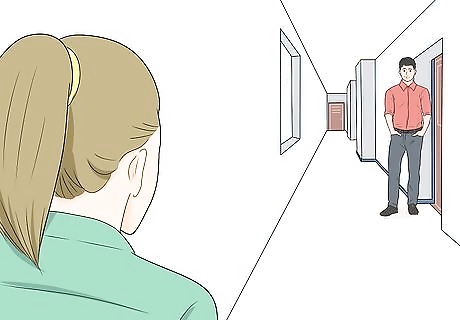
Watch out for your neighbors. It's hard to judge your neighbors' attitude. Some of them may not mind you bending the rules, while others may be irritated. Some people may have specifically chosen that apartment complex because they dislike dogs. Be polite to your neighbors at all times. Keep your dog from jumping on them, barking, or generally disturbing anyone. If you're respectful of your neighbors, they're more likely to like you. This will decrease the likelihood they'll report you to the landlord if they catch you with a dog.
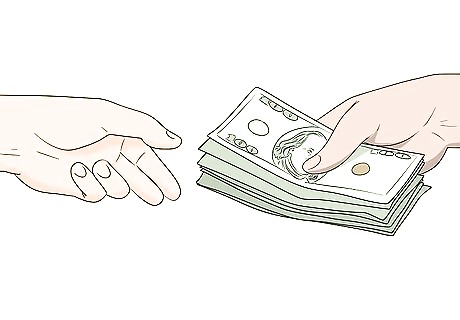
Prepare to pay for damages upfront. A pet deposit usually covers any damage caused by a pet. If your dog, say, chews up the carpet, the $300 you put down for the pet deposit will cover this. However, if you're sneaking your dog in, you won't have a pet despot as a buffer. In the event your dog damages the unit, you will have to pay any damages upfront.
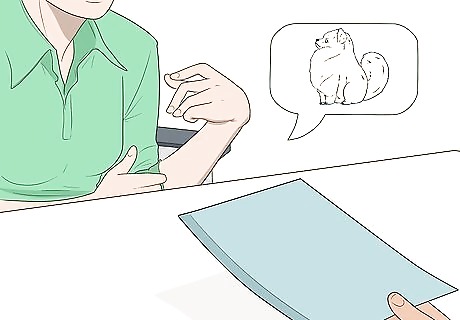
Try to negotiate with your landlord instead. It's always best not to break the rules. You could get in a lot of trouble and end up spending a lot of money sneaking in a dog. You may be able to convince a landlord to make an exception to the no pets rule. You can explain to a potential landlord that you have a dog. If there are any reasons you cannot give the dog up, let him or her know. For example, maybe your dog has special needs and would not do well with another owner. Offer to write up a contract. You could provide a legal document promising to take care of any damages done by your dog. You and your landlord could both agree on the terms of the document. If the landlord sees you're willing to take responsibility and pay potential damages, he or she may be more willing to allow you to have a dog.



















Comments
0 comment